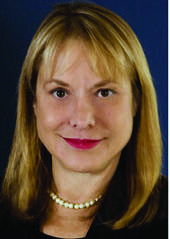I went to an event the other night in support of the Jewish Federation of Los Angeles. We heard from Jewish leaders about what was going on in Israel, as well as from police officials about what they were doing to protect us here at home.
Everyone had stories to tell — of random acts of violence and antisemitism and hatred directed towards Jews. There was a palpable sense of anxiety that was not diminished by the metal detectors and ID checks we all went through before entering the beautiful home where the event was held.
On the local front, there was much talk about the homicide of a Jewish man in Thousand Oaks who was attacked at a street corner when the pro-Israel protestors met up with the pro-Palestinian protestors. He had fallen on his head after being struck by a blunt object, supposedly a megaphone. The police, after investigating and reviewing video footage, arrested a Moorpark College professor, charging him with involuntary manslaughter. No charges of a hate crime, at least not yet. Reportedly, the assailant didn’t come to the protest with the intent to injure or kill anyone. It just happened, so we are told. The community was relieved that some action has been taken, but only to a point. The point is, how could this happen? What is going on?
Then there was talk of the woman in Brentwood, one of the fancy neighborhoods in this city, whose car window was smashed, supposedly in an act of antisemitic violence. How did the vandals know she was Jewish? Was there a bumper sticker on her car associated with a Jewish school? Or was it just a random act of violence that happened to be taken against a Jewish woman with a baby in her car in what is supposed to be a peaceful section of town? Every such incident is now being viewed through the prism of antisemitism that is now being outed, everywhere.
And there was the story of a young woman who was approached because she was wearing a Beatles jacket that some fool in West Hollywood thought was a Nazi jacket and, when told that it wasn’t, was actually disappointed. The young woman was so unnerved that she took off her jacket and called her parents for a ride home.
Everyone had stories. Everyone was at least a little bit on edge, more than a little bit. Have you heard about the bus drivers who refused to drive the Jews from Detroit to the pro-Israel march? Could it be true?
I was wearing my star of David necklace, which I always wear. “Are you thinking of taking it off?” I was asked. I was not, but I did put it inside my sweater last week when I had to walk through a pro-Palestinian demonstration in Washington, D.C., to get to a corner where I could call an Uber. I felt sheepish pushing it under the collar, but it seemed like asking for trouble not to do so. From the river to the sea, the demonstrators chanted. That and, “Down with Biden.”
A friend confided that her daughter had taken the mezuzah down from her door. She lives in a neighborhood where there are many orthodox Jews. Another friend, a law professor, confided that her students are now taking off their yarmulkes when they go into New Haven. You just don’t want to be a target.
And then there is Elon Musk, with his antisemitic screed. How can he use his power this way? Is he ignorant or a true hater?
Random acts of antisemitism, and the growing anxiety they trigger, are rampant. Not every Jew supports Benjamin Netanyahu, and certainly not every Israeli does. We take no pleasure in the deaths of Gazan children. But what did Hamas think was going to happen? It is hard to escape the conclusion that this is exactly what they wanted to see happen, that they were willing to sacrifice their children on the altar of antisemitism. It is hard not to be anxious.
“Aren’t you frightened?” a friend asked me. I am a crime victim, a survivor of violence. But I never felt it was my religion that set me up to be a target in my own neighborhood. Now I know it, and never again is now. The case that the Jewish people need a homeland to call our own has never been clearer than it is right now. Hamas has proven that as well. And the random acts of violence, the random expressions of antisemitism by those who should know better, are everywhere.
“Be safe,” we tell each other. And we mean it. Broken windows, criminologists tell us, contribute to fear of crime, a pox that is as deadly as crime itself. Our windows have been broken, and then some. Our sense of security is gone.




